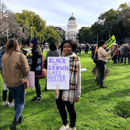Depression is a common mental health issue that many are familiar with. However, it may be difficult to recognize at first. Depression can sometimes mask itself as disinterest or shyness in a person. Knowing the difference between someone’s usual behavior and depression can be hard to detect even in those closest to us.
Medically speaking, depression, also known as major depressive disorder (MDD), or clinical depression, is a type of mood disorder that causes a constant sadness and hopelessness. Depression also includes outbursts of anger and irritability. This is not a word that should be taken lightly or used casually. Depression is usually diagnosed after the symptoms have persisted for two weeks or more. It should not be joked about.
So how do we determine if the people around us are depressed? Depression isn’t something you have to be constantly looking out for, but if you know this person is going through a rough patch in their life, or is acting noticeably different from their usual self, it’s good to keep in mind. There are several signs to look out for when detecting depression. The big ones include:
-
Loss of interest in day-to-day activities
-
Lack of energy or reduced effort
-
Fluctuating appetite
-
Anxiety or restlessness
-
Strong feelings of guilt or self-hate
-
Insomnia or sleep disturbances
-
Physical complaints, such as headaches or joint pain/soreness
-
Suicidal thoughts
Recognizing depression can be difficult because of your own self-doubt in how well you know the person or accepting something you don’t want to be true. If you see any of these symptoms in someone, even if it may seem like a phase during midterm season or finals week, a simple, “Are you okay?” can’t hurt. You don’t want to lose someone to depression, especially if they have suicidal thoughts and/or tendencies.
What if this person doesn’t respond to your inquiries? What if they “don’t want to talk about it,” or brush you off when you ask what’s wrong? When a close family member of mine died, I wanted nothing more than to be comforted. I wanted my friends to push farther than, “What’s wrong?” when I told them I was fine. Some of them did, and to those friends, I am thankful because if they hadn’t, I wouldn’t have felt welcome or understood by my own peers.
While it’s important to give people space, it’s also important to let them know that you’re there for them. If they don’t want to talk about it, maybe say something like, “Okay, but if you do, please call me” or, “I’m ready to listen whenever you want to talk.” Sometimes just knowing you care can keep a person going in their darkest moments, even if they don’t want to express themselves.
Don’t ever underestimate the power of friendship. It has been known to save lives.
Sometimes just being friendly and encouraging can help someone you may not realize needs help. Believe it or not, people can be very good at hiding their emotions, even from their closest friends. If you know something is off, but also see that they clearly don’t want to talk about it, don’t act awkward. It can be a hard position to navigate, but ultimately make sure your friend knows you care about them. You don’t have to interrogate them about what’s bothering them, but don’t ignore it, either. Be the friend you’d want to have.



